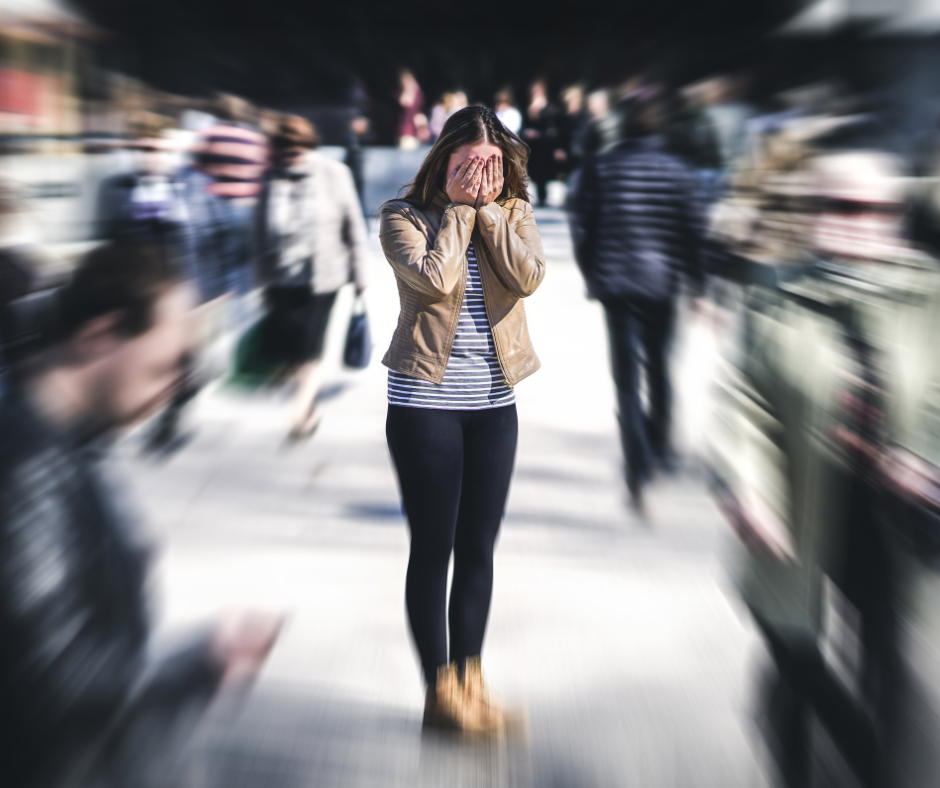Social Anxiety Disorder
An estimated 12.1% of U.S. adults experience social anxiety disorder at some point in their lives.
If you have been experiencing fear or anxiety about being judged by others, feeling self-conscious in social situations, or avoiding meeting new people for at least 6 months, and these feelings are making it difficult for you to do everyday tasks like talking to people at work or school, you may have social anxiety disorder. This disorder is characterized by a persistent and intense fear of being watched and judged by others, which can affect daily activities like work and school, and even make it hard to make and maintain friendships. However, it is important to note that social anxiety disorder is treatable. If you are experiencing these symptoms, it is recommended that you learn more about social anxiety disorder and seek help.

What is social anxiety disorder?
Social anxiety disorder is a common type of anxiety disorder in which a person experiences intense fear or anxiety in social situations where they may be evaluated or judged by others, such as speaking in public, meeting new people, or attending a job interview. Doing everyday activities, like eating or drinking in front of others or using a public restroom, may also cause anxiety or fear due to concerns about being humiliated or rejected. This fear may be so intense that it feels beyond the person's control and can interfere with work, school, or other daily activities. Some people with social anxiety disorder may worry about social situations for weeks before they happen and may avoid events or places that cause distress or embarrassment. Others may be able to participate in these activities but experience a great deal of fear or anxiety while doing so. In some cases, social anxiety disorder may manifest as anxiety related to performances, such as giving a speech, playing a musical instrument on stage, or competing in a sports game. Social anxiety disorder typically begins in late childhood and may resemble extreme shyness or avoidance of social interactions. It is more common in females than males, particularly in adolescents and young adults. Without treatment, social anxiety disorder can last for many years or even a lifetime.
Signs and symptoms of social anxiety disorder
People with social anxiety disorder may experience physical symptoms, such as blushing, sweating, or trembling, and may have a rapid heart rate when they are in social situations or around others. They may also feel that their mind goes blank or feel sick to their stomach. Additionally, they may have a rigid body posture or speak with an overly soft voice, and may struggle with making eye contact or interacting with people they don't know. They may also feel self-conscious or fear being judged negatively by others, and may avoid social situations or places where there are other people.
What causes social anxiety disorder?
It is not fully understood why certain people may develop social anxiety disorder while others do not, but it is thought that there may be a genetic component to the condition. Researchers have identified that certain areas of the brain are involved in fear and anxiety and that genetics can influence the functioning of these areas. By studying the interaction between the brain and body in people with social anxiety disorder, researchers hope to develop more targeted treatments. Additionally, they are examining the ways in which stress and environmental factors may contribute to the development of the disorder.
How is social anxiety disorder treated?
If you are concerned that you may have social anxiety disorder, it is recommended that you speak with a healthcare provider. After discussing your history, the healthcare provider may conduct a physical exam to rule out any physical conditions that may be causing your symptoms. They may then refer you to a mental health professional, such as a psychiatrist, psychologist, or clinical social worker, for further evaluation and diagnosis. The most effective treatment for social anxiety disorder typically involves a combination of psychotherapy (also known as "talk therapy") and medication, and a healthcare provider can help you determine the best treatment plan for your individual needs. It is important to seek treatment as soon as possible to ensure the most successful outcome.
Psychotherapy
Cognitive behavioral therapy (CBT) is a type of psychotherapy that is commonly used to treat social anxiety disorder and has been shown to be effective through research. CBT helps you learn new ways of thinking, behaving, and reacting to situations that can reduce anxiety and fear. It also involves learning and practicing social skills, which is important for the treatment of social anxiety disorder. CBT is considered the gold standard for psychotherapy and can be delivered in a group therapy format, which may offer additional benefits for social anxiety disorder. Another treatment option for social anxiety disorder is acceptance and commitment therapy (ACT), which uses strategies such as mindfulness and goal setting to reduce discomfort and anxiety. ACT is a newer form of psychotherapy, so there is less research available on its effectiveness. However, different therapies work for different people, so it is important to discuss your options with a mental health professional to determine the best treatment plan for you. One aspect of CBT called exposure therapy involves gradually confronting the fears underlying an anxiety disorder to help you participate in activities you have been avoiding, often in combination with relaxation exercises.
Medication
There are several different types of medication that may be used to treat social anxiety disorder, including antidepressants such as selective serotonin reuptake inhibitors (SSRIs) and serotonin-norepinephrine reuptake inhibitors (SNRIs), beta-blockers, and anti-anxiety medications such as benzodiazepines. SSRIs and SNRIs are commonly used to treat depression, but can also be effective in treating the symptoms of social anxiety disorder. However, they may take several weeks to start working and may cause side effects such as headaches, nausea, or difficulty sleeping. Beta-blockers can help control some of the physical symptoms of social anxiety disorder, such as a rapid heart rate, sweating, and tremors, and are often the medication of choice for "performance anxiety" types of social anxiety disorder. Benzodiazepines are powerful anti-anxiety sedative medications that can quickly reduce anxious feelings, but can also cause tolerance and dependency and may only be prescribed for brief periods of time. It may take some time for both medication and psychotherapy to work, and it is common for people to try more than one medication before finding the best one for them. A healthcare provider can work with you to determine the best medication, dose, and duration of treatment based on your individual needs and may recommend a combination of medication and cognitive behavioral therapy (CBT) or other psychotherapies.
For basic information about these and other mental health medications, visit the National Institute of Mental Health (NIMH) Medications webpage.
Support Groups
Many people with social anxiety disorder find support groups helpful in managing their condition. In a group of people who all have social anxiety disorder, you can receive honest feedback about how others see you, which can help you realize that your thoughts about judgment and rejection may be distorted or untrue. Support groups can also provide a way for you to learn how others with social anxiety disorder approach and overcome the fear of social situations. Support groups are available both in person and online, but it is important to remember that any advice you receive from a support group member should be used cautiously and should not replace treatment recommendations from a healthcare provider. In addition to psychotherapy and medication, maintaining a healthy lifestyle can also help to manage anxiety. This includes getting enough sleep, exercising regularly, eating a healthy diet, and seeking support from trusted family and friends.
Supporting yourself and others with social anxiety disorder?
One way to help yourself or a loved one who may be dealing with social anxiety disorder is to educate yourself about the condition. Research the warning signs, learn about treatment options, and stay up to date with current research. It is also important to communicate openly about your feelings if you are experiencing symptoms of social anxiety disorder or if you suspect that a friend or family member may be struggling with the condition. Set aside time to have an honest conversation and express your concern and offer your support. If anxiety is causing problems in everyday life, such as avoiding social situations at school, work, or with friends and family, it is important to seek professional help. Talk to a healthcare provider about your mental health and explore treatment options.
Essential Reading
Turn your anxiety into power with Harvard-based psychologist Dr. Luana Marques's 3-step method for living boldly. Her clinically proven approach has helped her clients - from CEOs to at-risk teens-transform their lives.
Bold Move shares a tried-and-tested method to get you out of your rut and on the road to a more meaningful life. Regardless of the challenges you're facing, Dr. Luana pinpoints psychological avoidance as the root of untapped potential and shows you how to overcome it to move toward a bold life.
Dr. Luana understands anxiety. After decades of research, teaching, and clinical practice, she realized that the coping techniques she learned from her mother and grandmother while growing up in tough circumstances in Brazil mirror science-based cognitive behavioral therapy. Her path from adversity to success and fulfillment as a Harvard clinician and researcher has given her the insights and skills to help anyone navigate change, discomfort, and stress.
Bold Move combines intriguing real-life stories and practical exercises backed by the most recent scientific research. Dr. Luana's 3-step plan...
- outlines the many forms that psychological avoidance can take
- helps you recognize thinking patterns that leave you tense, anxious, and worried
- explains the importance of being your own best friend
- shows you why "just do it" doesn't get it done
- strategizes ways to align your values with actions to propel you toward your dreams
With expertise, humor, and compassion, Bold Move offers a groundbreaking, transformative approach that can work for anyone.
Bold Move: A 3-Step Plan to Transform Anxiety into Power is available from your favorite bookseller & online internationally from Amazon.
Recent Articles
-
Psychological Impact of Catastrophic Injury & Recovery
Feb 17, 26 02:26 AM
Explore the psychological impact of catastrophic injury, including trauma, identity shifts, resilience, and long-term mental health recovery. -
Psychology Articles by David Webb
Feb 10, 26 06:31 AM
Discover psychology articles by David Webb, featuring science-based insights into why we think, feel, and behave the way we do. -
Music and Memory: How Songs Shape Identity, Emotion, and Life Stories
Feb 10, 26 06:25 AM
How music and memory intertwine to preserve identity, evoke emotion, and anchor life stories. A psychological look at playlists, nostalgia, and the brain.
Please help support this website by visiting the All About Psychology Amazon Store to check out an awesome collection of psychology books, gifts and T-shirts.
Know someone who would be interested in reading this social anxiety disorder information guide? Share This Page With Them.
Go From Social Anxiety Disorder Information Guide Back To The Home Page







